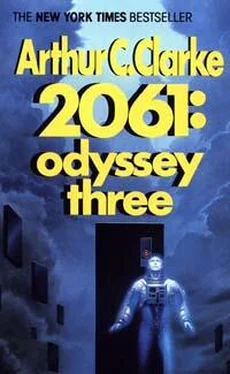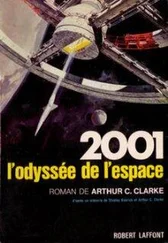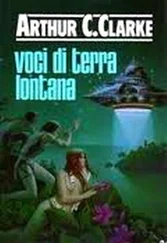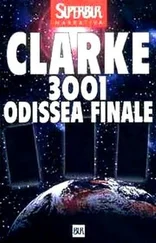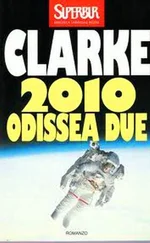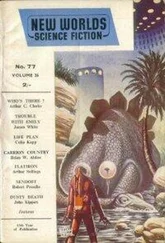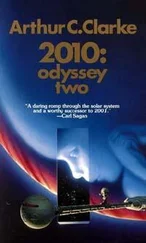Arthur Clarke - 2061 - Odyssey Three
Здесь есть возможность читать онлайн «Arthur Clarke - 2061 - Odyssey Three» весь текст электронной книги совершенно бесплатно (целиком полную версию без сокращений). В некоторых случаях можно слушать аудио, скачать через торрент в формате fb2 и присутствует краткое содержание. Жанр: Фантастика и фэнтези, на английском языке. Описание произведения, (предисловие) а так же отзывы посетителей доступны на портале библиотеки ЛибКат.
- Название:2061: Odyssey Three
- Автор:
- Жанр:
- Год:неизвестен
- ISBN:нет данных
- Рейтинг книги:3 / 5. Голосов: 1
-
Избранное:Добавить в избранное
- Отзывы:
-
Ваша оценка:
- 60
- 1
- 2
- 3
- 4
- 5
2061: Odyssey Three: краткое содержание, описание и аннотация
Предлагаем к чтению аннотацию, описание, краткое содержание или предисловие (зависит от того, что написал сам автор книги «2061: Odyssey Three»). Если вы не нашли необходимую информацию о книге — напишите в комментариях, мы постараемся отыскать её.
2061: Odyssey Three — читать онлайн бесплатно полную книгу (весь текст) целиком
Ниже представлен текст книги, разбитый по страницам. Система сохранения места последней прочитанной страницы, позволяет с удобством читать онлайн бесплатно книгу «2061: Odyssey Three», без необходимости каждый раз заново искать на чём Вы остановились. Поставьте закладку, и сможете в любой момент перейти на страницу, на которой закончили чтение.
Интервал:
Закладка:
23 – Inferno
Before the detonation of Jupiter, Io had been second only to Venus as the best approximation to Hell in the Solar System. Now that Lucifer had raised its surface temperature another couple of hundred degrees, even Venus could no longer compete.
The sulphur volcanoes and geysers had multiplied their activity, now reshaping the features of the tormented satellite in years rather than decades. The planetologists had given up any attempt at mapmaking, and contented themselves with taking orbital photographs every few days. From these, they had constructed awe-inspiring time-lapse movies of inferno in action.
Lloyd's of London had charged a stiff premium for this leg of the mission, but Io posed no real danger to a ship doing a flyby at a minimum range of ten thousand kilometres – and over the relatively quiescent nightside at that.
As he watched the approaching yellow and orange globe – the most improbably garish object in the entire Solar System – Second Officer Chris Floyd could not help recalling the time, now half a century ago, when his grandfather had come this way. Here, Leonov had made its rendezvous with the abandoned Discovery, and here Dr Chandra had reawakened the dormant computer Hal. Then both ships had flown on to survey the enormous black monolith hovering at L1, the Inner Lagrange Point between Io and Jupiter.
Now the monolith was gone – and so was Jupiter. The minisun that had risen like a phoenix from the implosion of the giant planet had turned its satellites into what was virtually another Solar System, though only on Ganymede and Europa were there regions with Earthlike temperatures. How long that would continue to be the case, no-one knew. Estimates of Lucifer's life-span ranged from a thousand to a million years.
Galaxy's science team looked wistfully at the L1 point, but it was now far too dangerous to approach. There had always been a river of electrical energy – the Io 'flux tube' – flowing between Jupiter and its inner satellite, and the creation of Lucifer had increased its strength several hundredfold. Sometimes the river of power could even be seen by the naked eye, glowing yellow with the characteristic light of ionized sodium. Some engineers on Ganymede had talked hopefully about tapping the gigawatts going to waste next door, but no-one could think of a plausible way of doing so.
The first penetrometer was launched, with vulgar comments from the crew, and two hours later drove like a hypodermic needle into the festering satellite. It continued to operate for almost five seconds – ten times its designed lifetime – broadcasting thousands of chemical, physical and rheological measurements, before Io demolished it.
The scientists were ecstatic; van der Berg was merely pleased. He had expected the probe to work; Io was an absurdly easy target. But if he was right about Europa, the second penetrometer would surely fail.
Yet that would prove nothing; it might fail for a dozen good reasons. And when it did, there would be no alternative but a landing.
Which, of course, was totally prohibited – not only by the laws of man.
24 – Shaka the Great
ASTROPOL – which, despite its grandiose title, had disappointingly little business off Earth – would not admit that SHAKA really existed. The USSA took exactly the same position, and its diplomats became embarrassed or indignant when anyone was tactless enough to mention the name.
But Newton's Third Law applies in politics, as in everything else. The Bund had its extremists -though it tried, sometimes not very hard, to disown them – continually plotting against the USSA. Usually they confined themselves to attempts at commercial sabotage, but there were occasional explosions, disappearances and even assassinations.
Needless to say, the South Africans did not take this lightly. They reacted by establishing their own official counter-intelligence services, which also had a rather free-wheeling range of operations – and likewise claimed to know nothing about SHAKA. Perhaps they were employing the useful CIA invention of 'plausible deniability'. It is even possible that they were telling the truth.
According to one theory, SHAKA started as a codeword, and then – rather like Prokofiev's 'Lieutenant Kije' – had acquired a life of its own, because it was useful to various clandestine bureaucracies. This would certainly account for the fact that none of its members had ever defected, or even been arrested.
But there was another, somewhat far-fetched explanation for this, according to those who believed that SHAKA really did exist. All its agents had been psychologically conditioned to self-destruct before there was any possibility of interrogation.
Whatever the truth, no-one could seriously imagine that, more than two centuries after his death, the legend of the great Zulu tyrant would cast its shadow across worlds he never knew.
25 – The Shrouded World
During the decade after the ignition of Jupiter, and the spreading of the Great Thaw across its satellite system, Europa had been left strictly alone. Then the Chinese had made a swift flyby, probing the clouds with radar in an attempt to locate the wreck of the Tsien. They had been unsuccessful, but their maps of dayside were the first to show the new continents now emerging as the ice-cover melted.
They had also discovered a perfectly straight two-kilometre-long feature which looked so artificial that it was christened the Great Wall. Because of its shape and size it was assumed to be the Monolith -or a monolith, since millions had been replicated in the hours before the creation of Lucifer.
However, there had been no reaction, or any hint of an intelligent signal, from below the steadily thickening clouds. So a few years later, survey satellites were placed in permanent orbit, and high-altitude balloons were dropped into the atmosphere to study its wind patterns. Terrestrial meteorologists found these of absorbing interest, because Europa – with a central ocean, and a sun that never set – presented a beautifully simplified model for their text-books.
So had begun the game of 'Europan Roulette', as the administrators were fond of calling it whenever the scientists proposed getting closer to the satellite.
After fifty uneventful years, it had become somewhat boring. Captain Laplace hoped it would remain that way, and had required considerable reassurance from Dr Anderson.
'Personally,' he had told the scientist, 'I would regard it as a slightly unfriendly act, to have a ton of armour-piercing hardware dropped on me at a thousand kilometres an hour. I'm quite surprised the World Council gave you permission.'
Dr Anderson was also a little surprised, though he might not have been had he known that the project was the last item on a long agenda of a Science SubCommittee late on a Friday afternoon. Of such trifles history is made.
'I agree, Captain. But we are operating under very strict limitations, and there's no possibility of interfering with the – ah – Europans, whoever they are. We're aiming at a target five kilometres above sea level.'
'So I understand. What's so interesting about Mount Zeus?'
'It's a total mystery. It wasn't even there, only a few years ago. So you can understand why it drives the geologists crazy.'
'And your gadget will analyse it when it goes in.'
'Exactly. And – I really shouldn't be telling you this – but I've been asked to keep the results confidential, and to send them back to Earth encrypted. Obviously, someone's on the track of a major discovery, and wants to make quite sure they're not beaten to a publication. Would you believe that scientists could be so petty?'
Читать дальшеИнтервал:
Закладка:
Похожие книги на «2061: Odyssey Three»
Представляем Вашему вниманию похожие книги на «2061: Odyssey Three» списком для выбора. Мы отобрали схожую по названию и смыслу литературу в надежде предоставить читателям больше вариантов отыскать новые, интересные, ещё непрочитанные произведения.
Обсуждение, отзывы о книге «2061: Odyssey Three» и просто собственные мнения читателей. Оставьте ваши комментарии, напишите, что Вы думаете о произведении, его смысле или главных героях. Укажите что конкретно понравилось, а что нет, и почему Вы так считаете.
